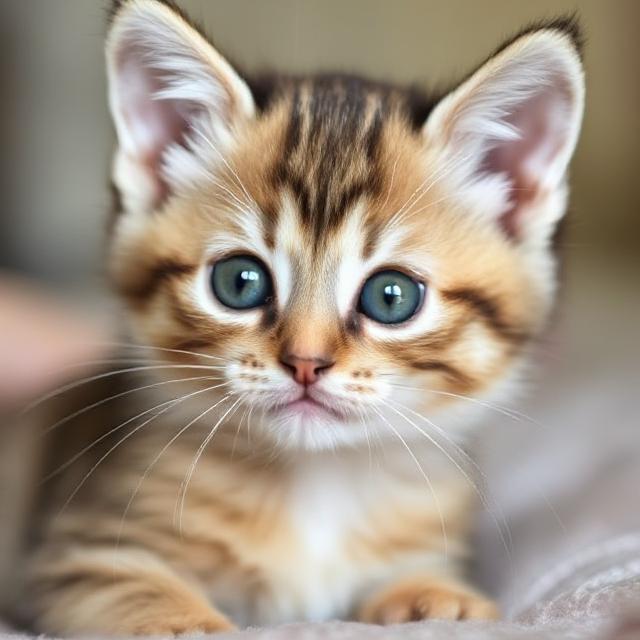How Can I Prevent Eye Infections in Kittens?
Kittens, with their playful antics and irresistible charm, bring joy to any home. However, their vulnerable immune systems make them susceptible to various ailments, including eye infections. These infections, while often treatable, can be uncomfortable and even lead to more serious complications if left unaddressed. Understanding how to safeguard your kitten’s eyes is crucial for ensuring their overall health and well-being.
Understanding the Risks: Why Are Kittens Prone to Eye Infections?
Several factors contribute to the increased susceptibility of kittens to eye infections. Firstly, their immune systems are still developing, making them less capable of fighting off pathogens. Secondly, kittens often live in close proximity to other cats, increasing their exposure to infectious agents like bacteria, viruses, and fungi. Finally, underlying conditions like feline herpesvirus (FHV-1) can weaken their immune systems and make them more prone to secondary infections.
Common types of eye infections in kittens include conjunctivitis (inflammation of the conjunctiva, the membrane lining the eyelids and covering the white part of the eye), upper respiratory infections that affect the eyes, and infections caused by trauma or foreign objects. Recognizing the signs of an eye infection early is critical for ensuring prompt treatment and preventing potential complications.
Essential Strategies: Steps to Prevent Feline Eye Infections
Fortunately, there are several proactive measures you can take to minimize your kitten’s risk of developing eye infections. These preventative strategies focus on maintaining a clean environment, strengthening the kitten’s immune system, and promptly addressing any potential health issues.
-
Maintaining a Clean and Hygienic Environment: A clean environment is paramount for preventing a wide range of health problems, including eye infections. Regularly clean and disinfect your kitten’s living area, including their bedding, food and water bowls, and litter box. This will help to reduce the number of pathogens present in their environment.
-
Boosting the Immune System: A strong immune system is essential for fighting off infections. Ensure your kitten receives a well-balanced, high-quality diet specifically formulated for kittens. This will provide them with the necessary nutrients to support their immune system. Discuss with your veterinarian whether supplements like L-lysine might be beneficial, especially if your kitten is prone to upper respiratory infections.
-
Vaccination is Key: Proper vaccination is a cornerstone of preventative care. Consult with your veterinarian to ensure your kitten receives all necessary vaccinations, including those that protect against feline herpesvirus and feline calicivirus, both of which can cause eye infections. Follow your veterinarian’s recommended vaccination schedule to maintain optimal protection.
-
Minimizing Exposure to Other Cats: If possible, limit your kitten’s exposure to other cats, especially those with unknown health histories. This is particularly important during the early months when their immune system is still developing. If you have other cats in your household, ensure they are healthy and up-to-date on their vaccinations.
Specific Considerations: How Can I Prevent Eye Infections by Monitoring your Kitten’s Health?
Regular observation of your kitten’s eyes is crucial for early detection of any potential problems. Look for signs such as redness, swelling, discharge (clear, yellow, or green), excessive tearing, squinting, and rubbing or pawing at the eyes. Any of these symptoms warrant a prompt visit to the veterinarian.
-
Daily Observation: Make it a part of your daily routine to visually inspect your kitten’s eyes. This allows you to quickly identify any changes or abnormalities.
-
Early Veterinary Intervention: If you notice any signs of an eye infection, don’t delay seeking veterinary care. Early treatment can prevent the infection from worsening and causing more serious complications. Your veterinarian can diagnose the underlying cause of the infection and prescribe appropriate treatment, such as antibiotic eye drops or ointments.
-
Proper Cleaning Techniques: If your veterinarian recommends cleaning your kitten’s eyes, use a soft, damp cloth or cotton ball to gently wipe away any discharge. Use a separate cloth for each eye to prevent the spread of infection. Avoid using harsh chemicals or soaps, as these can irritate the eyes.
Addressing Underlying Conditions
In some cases, eye infections may be secondary to underlying conditions, such as feline herpesvirus (FHV-1). This virus can cause recurrent eye infections and upper respiratory problems. While there is no cure for FHV-1, management strategies can help to control the symptoms and reduce the frequency of outbreaks. L-lysine supplementation, antiviral medications, and stress reduction can all play a role in managing FHV-1.
Conclusion: A Proactive Approach to Kitten Eye Health
Preventing eye infections in kittens requires a multifaceted approach that includes maintaining a clean environment, boosting their immune system, proper vaccination, and diligent monitoring. By taking these proactive steps, you can significantly reduce your kitten’s risk of developing eye infections and ensure they enjoy a healthy and happy life. Remember, if you notice any signs of an eye infection, don’t hesitate to seek veterinary care for prompt diagnosis and treatment. Your vigilance and care will help your kitten maintain clear, bright eyes and a playful spirit for years to come.

